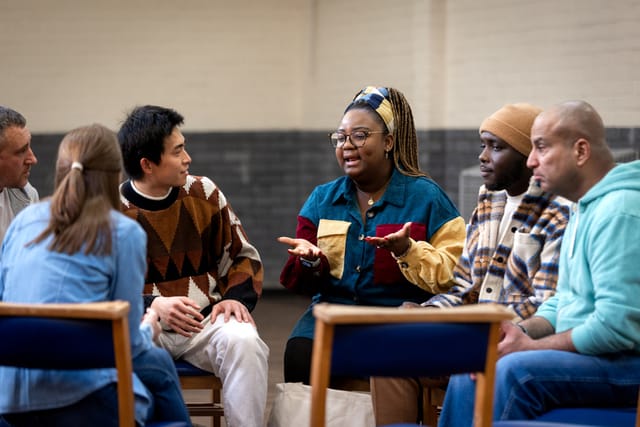No matter how good you think you are at reading the room and judging character, you’re still just a human, and that means you’re capable of getting it wrong. So, how do you know when you’ve completely misread a situation and have really messed up? These signs say it all.
1. You’re actually surprised by everyone’s reaction.
You know you’ve misread a situation when you say something you think is right on the money, but everyone looks at you like you just grew another head. Maybe you made a joke you thought was hilarious, but the room went silent. Or you shared an opinion, expecting nods, but instead, you got confused looks. It’s like that awkward record-scratch moment in a movie where everything stops, and you realize, “Oops, maybe that wasn’t right.”
2. The convo takes a turn for the worse.
When you’re in a conversation and suddenly it veers off in a direction you didn’t expect, you might have read the situation wrong. Maybe you brought up a topic thinking everyone would be into it, but it quickly gets changed. Or you’re getting one-word answers when you were ready for a deep dive. This unexpected shift is your clue to maybe ask more questions and get a better read on what the group’s feeling.
3. You’re getting a lot of one-word replies.

If you’re pouring out your thoughts or asking questions and getting nothing but “yeah” or “uh-huh” in return, it’s a pretty clear sign you might have misread the situation. You might think you’re having a great conversation, but the other person just isn’t on the same page. It’s about finding that sweet spot where the convo clicks for everyone involved.
4. Your jokes are seriously falling flat.
Cracking jokes is great, but if your attempts at humor are met with silence or forced smiles, it’s a sign you might have misread the room. Maybe your joke was a bit off for the audience, or the timing wasn’t right. Getting this kind of reaction from people doesn’t mean you’re not funny, necessarily; it just means your comedic timing or content might need a tweak. Reading the room’s mood and knowing your audience goes a long way in landing those punchlines.
5. People seem uncomfortable or anxious.

Maybe you brought up a topic that’s a bit too sensitive, or your approach was more intense than what the situation called for. It’s like turning up the music too loud at a get-together where people were enjoying quiet conversations. Observing body language and facial expressions can give you clues about how people are feeling. If they’re shifting in their seats, avoiding eye contact, or giving each other “help me” looks, abort the mission.
6. Everyone’s busy with their phones.

When you’re sharing a story or idea, and you notice everyone’s more interested in their phones than in what you’re saying, it’s a sign something’s off. You might think you’ve got the floor, but in reality, your audience has checked out. When this happens, it might be time to reassess the topic or check if there’s a better moment to share. People obviously aren’t feeling it, so it’s important to read the room.
7. Your suggestions get overlooked.
It’s not that your suggestions suck, they’re just not what people want or need right now. Maybe you thought your idea was a perfect fit, but it didn’t resonate with the group. It’s like suggesting a horror movie for movie night when everyone’s in the mood for a comedy. It’s about tuning in more closely to what others are interested in and finding common ground.
8. People ask you what you’re talking about.

When people question what you’re actually on about when you’re telling a story, they’re clearly not on the same page. It’s possible you misread the conversation and are taking it down an entirely different path than everyone else wanted it to go. If they don’t get you, you’re not getting it.
9. You feel like you’re talking to a wall.

If people just don’t pay attention to you when you talk, you might have misread their interest or mood. It’s like you’re giving a performance, but the audience isn’t captivated. Maybe your topic isn’t resonating, or perhaps it’s not the right time for that particular conversation. Observing and adapting to the level of engagement you’re receiving can help realign the conversation to everyone’s interest.
10. There’s no eye contact.
If people are avoiding eye contact, it might mean they’re not fully engaged or comfortable with the topic. It’s like serving a dish that no one wants to eat. Pay attention to these non-verbal cues to gauge if you need to shift the direction of the conversation or maybe lighten the mood a bit.
11. You get polite responses, but they’re not all that enthusiastic.

Perhaps you thought your tale would be a hit, but it’s received with courteous nods rather than genuine interest. It’s like sharing your favorite song, only to find others are just tapping their feet out of politeness. This can be a cue to try a different topic or ask others what they’re interested in discussing.
12. You get interrupted all the time.
It could be that you’re missing the group’s rhythm or talking about something that doesn’t quite gel with the current conversation. It’s like playing a solo that’s out of sync with the band’s tune. Try pausing and listening more, giving others the space to lead the conversation at times. This can provide insights into what topics are resonating and where you might align your contributions more effectively.
13. Your stories don’t get much follow-up.
When you tell a story and there’s little to no follow-up questions or comments, it might indicate a misread situation. You expected curiosity or further discussion, but instead, it falls flat. This lack of engagement can be a signal to switch gears or invite others to share their stories, creating a more reciprocal and engaging conversation dynamic.
14. You often feel out of sync with the mood.
If this happens a lot, you might be misreading the situation. Maybe you’re upbeat when the group is in a serious mode, or vice versa. It’s like dancing to a different beat than everyone else at the party. Being more attuned to the group’s mood and adjusting your approach can help you sync up and contribute more harmoniously to the conversation.
15. Conversations end abruptly when you start talking.
Maybe your input, though well-intentioned, isn’t quite fitting with the flow or interest of the group. It’s like putting a different genre of music in the middle of a playlist, causing a jarring shift. Paying attention to the natural flow and topics of conversation can help you find better moments to contribute effectively.
16. You’re noticing a lot of weird looks.

If you’re sharing and notice others exchanging quick glances, it’s a hint you might have misread the room. These subtle looks can mean they’re not fully vibing with what you’re saying. It’s like telling a joke that doesn’t land, and the audience communicates with looks instead of laughter. This is your cue to maybe switch gears, see what they think, or change the topic. It’s not just about what you’re saying, but also catching those non-verbal signals floating around.
17. People are always changing the topics you bring up.
If you find that people always seem to steer the conversation away from topics you bring up, it might signify a misread on your part. You might want to talk about a subject that you find fascinating, but everyone else is like, eh, not so much. If this happens a lot, don’t ignore it. This pattern can be a subtle hint that your chosen topics might not be as engaging for the group as they are for you.
Hope you found this helpful. Give it a like and follow Bolde on MSN for more!













